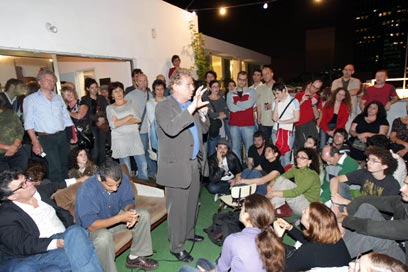
'Occupation fueling economic crisis'
Jewish revolutionary Daniel Cohn-Bendit, who led May '68 student protest, general strike in France says Israel's social unrest stems from economic madness created by settlements policy
More than 43 years have passed since Daniel Cohn-Bendit and his friends spearheaded the general strike in France, which prompted the government to raise the minimum wage by 25%. Now – from his seat at the European Parliament – the Jewish revolutionary is closely watching the unfolding social unrest in Israel.
According to Cohn-Bendit, Israelis have been protesting the growing gap between the rich and poor, but from his point of view, they lack the understanding of what really brought them out on the streets.
- Receive Ynetnews updates directly to your desktop
"The economic madness of the occupation and the settlements is what fermented the protests," Cohn-Bendit, who has become known as 'Dany le Rouge' ("Danny the Red") said in a conversation with Ynet.

'Danny the Red' speaking in Tel-Aviv in 2008 (Photo: Rafi Deloya)
"The Israeli government should feel threatened. The occupation and settlements are an ideological mistake and an economic insanity. The easiest and most appropriate economic solution would be to reach an agreement with the Palestinians," he added, saying it would free up funds intended for the country's defense establishment.
"I think your public discussion should revolve around Israel's way of life, the economic situation and the political threat," the French politician noted.
No comparison between protests
In May 1968, Cohn-Bendit led the student riots, sparked by dissatisfaction with the local education and employment systems, which culminated in a general strike of some 11 million Frenchmen. The social revolution forced Charles de Gaulle's government to hold early elections to parliament and raise the minimum wage.
During the uprising, Cohn-Bendit was subjected to a smear campaign due to his German-Jewish roots, and was denied reentry to France after he left for a visit in Berlin. Until this day, he remains one of the protest's main symbols.
'Danny the Red' claims the events of May 1968 cannot be compared to those taking place in Israel today. "I think the situation in Israel looks like what many – including us – have expected for a long time; the occupation of the Palestinians in the territories is a great threat on the Israeli economy. It should definitely pose a treat to the government as well because it needs to offer an alternative.
"Every faction in the opposition needs to ask itself what is the social and political alternative that Israel needs," he said.

With MK Dov Khenin in 2008 (Photo: Rafi Deloya)
Though Cohn-Bendit does not draw a direct link between the Arab Spring and the protest wave in Israel, he does point to a larger global phenomenon. "It's hard to see it from the European point of view, but it is apparent that different countries in the world have populations saying 'the future cannot be the same as the past.'
"Young people on the street want a different future. Look at the financial crisis in Europe and the United States and the ecological crisis in the world. There's a different sense of urgency and possibility. Israel also needs a big change, and needs to take a step forward," he said.
The former revolutionary said he hopes the tent protesters prevail in their struggle. "Of course I want them to succeed. I completely understand the young generation, who says, 'This is our life.' My advice to them – if this is your life, think of how to win; the answer is that the economic threat is intertwined with the settlements."
Despite his words of encouragement, Cohn-Bendit refrained from giving concrete advice. "I am not the leader of the protest. This is not the culture I live in, and therefore I can't tell them how to act, only give my interpretation," he said, adding that we are witnessing "an evolution in our societies, which are becoming more unjust".
"The rich become richer, and the middle class and poor become poorer. The same thing is happening in Israel, but that's what Netanyahu and the government want. Israel has injustice in the system, as can also be seen in Europe and the United States, But in addition, it has the issue of the settlements."
- Follow Ynetnews on Facebook










